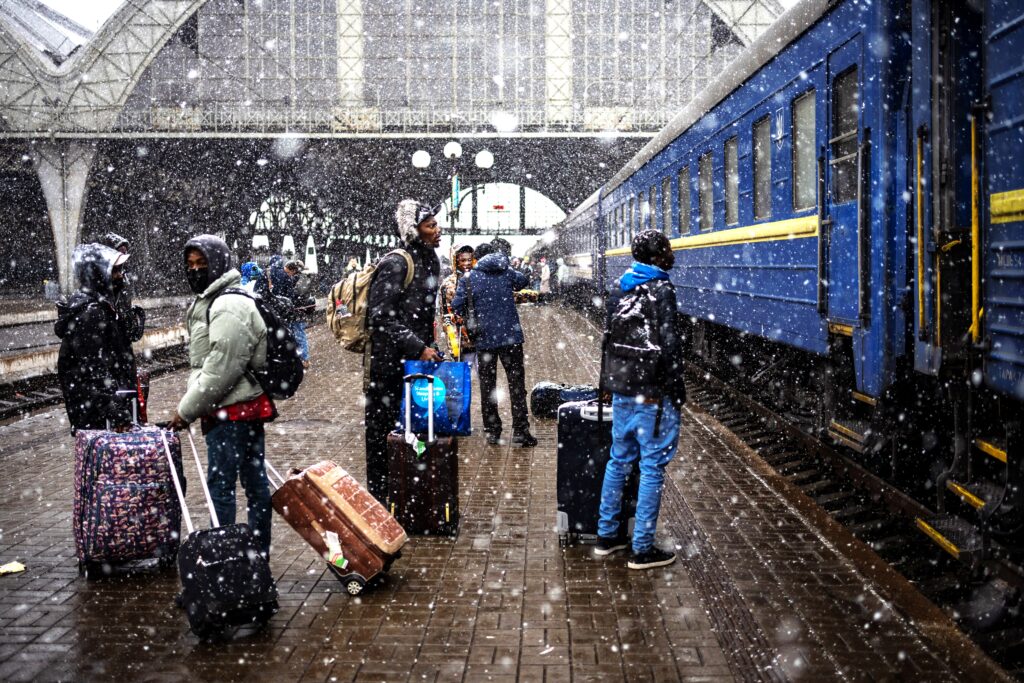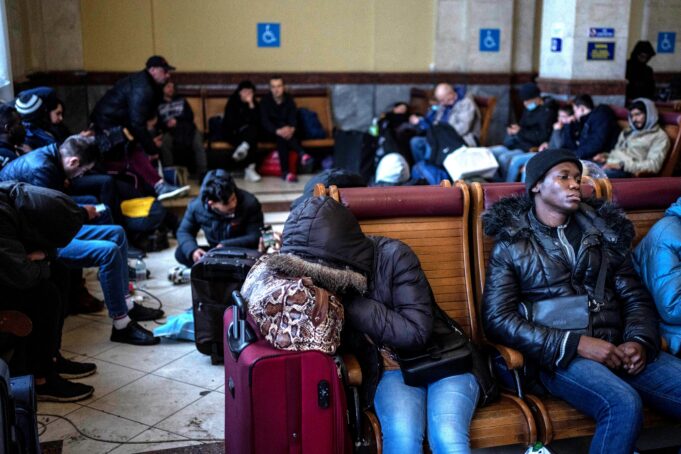A 29-year-old Nigerian student was studying trade and economics in Kharkiv, northeastern Ukraine, when war broke out. The student, who remained anonymous, spoke to a Nigerian activist in a recorded conversation, which was obtained by U.K.-based newspaper The Independent.
The student arrived at the Ukraine-Poland border on Feb. 27. Poland border guards reportedly confiscated his phone, and given very little options, he signed a form he did not understand.
“It was written in Polish. I didn’t know what I was signing. I said I wouldn’t sign, but they insisted I signed it and that if not I would go to jail for five months,” he said to the activist.
He was then taken to a court that lacked an interpreter, and shortly after, to a detention center in the small village of Lesznowola, he reported.
“It is a closed camp inside a forest,” the student said, speaking from the facility. “There’s no freedom. Some people have been here more than nine months. Some have gone mad. I’m scared.”
The Nigerian student is one of about 52 Africans who are being held in detention facilities in Poland. The Independent, in partnership with Lighthouse Reports, a nonprofit investigative organization, and other media partners, uncovered the discriminatory behavior against Africans escaping the war in Ukraine.
Maud Jullien, deputy investigations editor at Lighthouse Reports, traveled to Poland with others to get an understanding of what was happening on the ground. They spoke to volunteers who were previously helping refugees on the Belarus border. The volunteers were told students were being put into long-term detention sites, Ms. Jullien said to The Final Call. Only in Poland, they are being called “closed centers for foreigners,” she noted.
“We know that the conditions in there, they’re more like prisons, because they can’t get out. Their phones are taken from them. And they don’t have access, in most cases, they don’t have access to legal representation. They don’t have access to lawyers. So the whole situation is, in many ways, not legal,” she said.
The European Union, of which Poland is a member, issued a protection directive March 4 that allows refugees to live and work in one country for at least a year. The directive also applies to “nationals of third countries other than Ukraine residing legally in Ukraine who are unable to return in safe and durable conditions to their country or region of origin.” It includes those who were studying and working in Ukraine.
“International students in Ukraine, as well as Ukrainians, are at risk and risking their lives in the country. Detention, deportation or any other measure that does not grant them protection is not acceptable,” said Maria Arena, chair of the EU parliament’s subcommittee on human rights.
Ms. Jullien said she has heard about at least one case in Estonia and one in Austria. “It could be that there are more, but more people need to start investigating this if they can,” she said.
She went to one of the Poland detention sites herself with the names of the students that contacted the volunteers. “The guards there at the center confirmed that they were being held inside, and they told us that in total, there were 20 people inside,” she said.
She and her team obtained an official letter from the Polish border guard of the Polish government saying 52 people had crossed over from Ukraine and were being held. Ms. Jullien explained that because most non-Ukrainians crossed the border in the first few days of the conflict, and there were hardly any foreigners still crossing when they crossed. There is reason to believe that the number of people being detained has not increased.
“What we don’t know is if 52 is the actual number,” she said.
She does know that at least one family, a Nigerian man with a Kenyan wife and baby, was released. But despite pressure by their embassies, the students have not been released.

There are still a lot of unknowns, such as who exactly has been released and who has been moved from one center to another. Ms. Jullien and her team are working to find out as much as possible about the people detained. They are also working to contact family members of detainees and to get legal representation.
Aya Chebbi, a Pan-African feminist and diplomat, said to The Final Call that everything unfolding in terms of “all the layers of discrimination and colonial mentality of how to deal with this war is expected, because we see it in every crisis, in every conflict, in every war.”
She said the news of what’s happening in Poland is not surprising, as throughout history, Black Africans have been the first to be discriminated against. Ms. Chebbi resides in Tunisia and has been working throughout the African region on women and youth. She noted that a similar situation happened in Libya, which borders her country. But she said it shouldn’t be normalized.
“This is horrible, but this is expected. It is nothing new to how White Europe treats Black Africans. It’s nothing new. It’s been the history of Europe. But we could prevent it,” she said. “I think this needs attention now, and we need to make noise on it because we could prevent it. If that camp is closed, if Poland is held accountable, then it cannot spread across. And all the African students should be able to have safe passage to their countries or to go to other countries when they cannot go back.”
Dr. George Yancy, a professor of philosophy at Emory University and a scholar and author on Whiteness, pondered: “What would it be like to be an African student who has been welcomed into Ukraine, not envisioning this war, and now there’s this war in which like any other White Ukrainian, they could be killed? And then to leave that traumatic moment to enter into another traumatic moment, which is ostensibly said to be a directive to guarantee the safe passage of all those coming out of Ukraine?”
“Unless of course, the language needs to be specified, and it needs to be said ‘safe passage for all of those who are White Ukrainians,’ ” he added.
He described the situation as global Jim Crow racism. “What these long-term detention centers are saying to us, it’s communicating to us that Black bodies must be housed, that they must be treated differently,” he said.
During World War II, Polish refugees sought sanctuary in African countries such as Tanzania and Zimbabwe. And they were welcomed and treated as human beings, Dr. Yancy said.
“You see the duplicity, the contradictions, where we’ve got a war. We’ve got Black people who are fleeing, Africans, for their lives, and how are they treated? Well, they’re unwelcomed. Which says to us that the global world is a safe haven for White people for the most part,” he said.
He linked the situation in Poland to Dr. Martin Luther King Jr.’s dream where people would be judged based on the content of their character instead of the color of their skin.
“That sense of beloved community that King was talking about within the U.S., what we’re seeing is that beloved community not only does not exist in the United States, but we can see that the disease of that corrupt anti-Black community is continuing to thrive, continuing to flourish,” he said.













